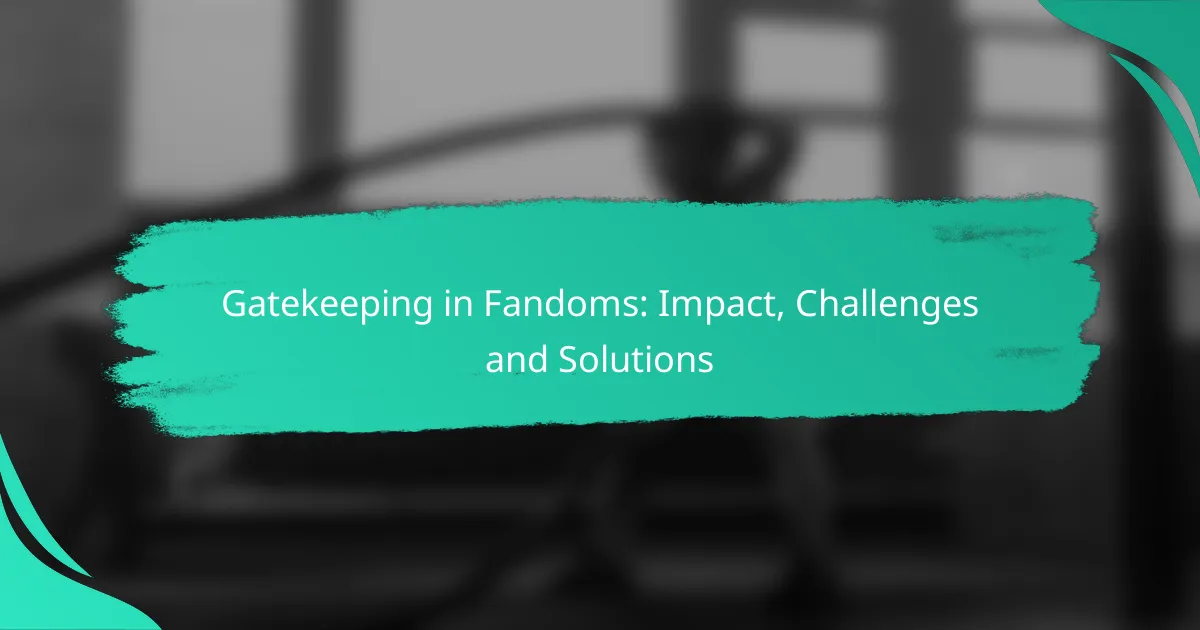Gatekeeping in fandoms poses a significant barrier to inclusivity, often hindering the participation of newcomers and stifling creativity within the community. This phenomenon can lead to a less diverse and vibrant environment, as established members may resist change and newcomers may feel unwelcome. To combat these challenges, it is essential to create inclusive spaces that embrace diverse voices and foster engagement through community guidelines and supportive events.
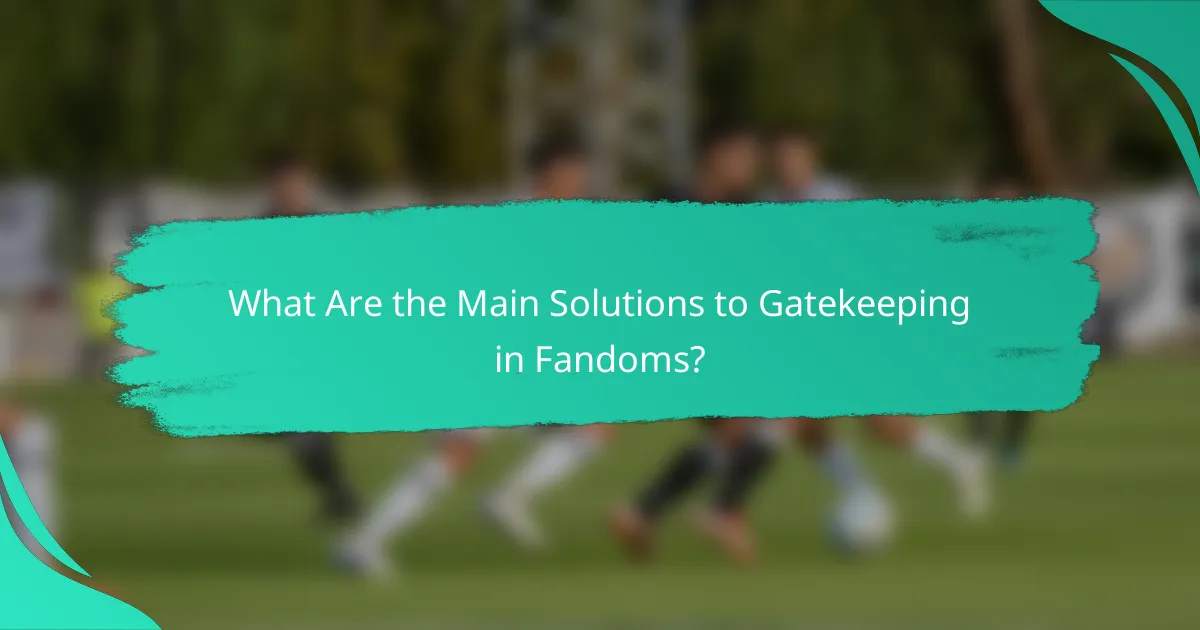
What Are the Main Solutions to Gatekeeping in Fandoms?
The main solutions to gatekeeping in fandoms involve creating inclusive environments that welcome diverse participants. By implementing community guidelines, hosting inclusive events, and supporting marginalized voices, fandoms can foster a more open and engaging culture.
Community guidelines and moderation
Establishing clear community guidelines is essential for reducing gatekeeping behaviors. These guidelines should promote respect, inclusivity, and constructive dialogue among members. Effective moderation can help enforce these rules and address any instances of exclusionary behavior promptly.
Fandoms can benefit from appointing moderators who reflect the community’s diversity. This ensures that various perspectives are represented and that moderation practices are sensitive to the needs of all members.
Inclusive events and initiatives
Hosting inclusive events is a powerful way to combat gatekeeping in fandoms. These events can include panels, workshops, and meetups that cater to a wide range of interests and backgrounds. By actively encouraging participation from underrepresented groups, fandoms can create a more welcoming atmosphere.
Consider organizing events that highlight diverse creators and their work. This can help broaden the community’s understanding of different perspectives and foster connections among fans from various backgrounds.
Education on fandom diversity
Educating members about the importance of diversity within fandoms is crucial for reducing gatekeeping. Workshops, articles, and discussions can help fans understand the value of different viewpoints and experiences. This knowledge can empower individuals to challenge exclusionary practices within their communities.
Fandoms can also provide resources that highlight the contributions of marginalized groups. Sharing stories and experiences can enhance empathy and encourage a culture of acceptance and support.
Support for marginalized voices
Actively supporting marginalized voices is vital for dismantling gatekeeping in fandoms. This can involve amplifying the work of creators from diverse backgrounds and ensuring their stories are represented. Fandoms should prioritize creating spaces where these voices can be heard and celebrated.
Encouraging collaboration between established and emerging creators can also help elevate underrepresented talent. This not only enriches the community but also fosters a sense of belonging among all members.
Collaboration with creators
Collaboration with creators can lead to more inclusive fandom experiences. Fandoms should engage with creators to understand their perspectives and promote their work. This partnership can help ensure that the content reflects a variety of voices and experiences.
Additionally, fandoms can organize events that feature creators discussing their work and the importance of inclusivity. This not only educates fans but also strengthens the bond between creators and their audiences, fostering a more inclusive community overall.
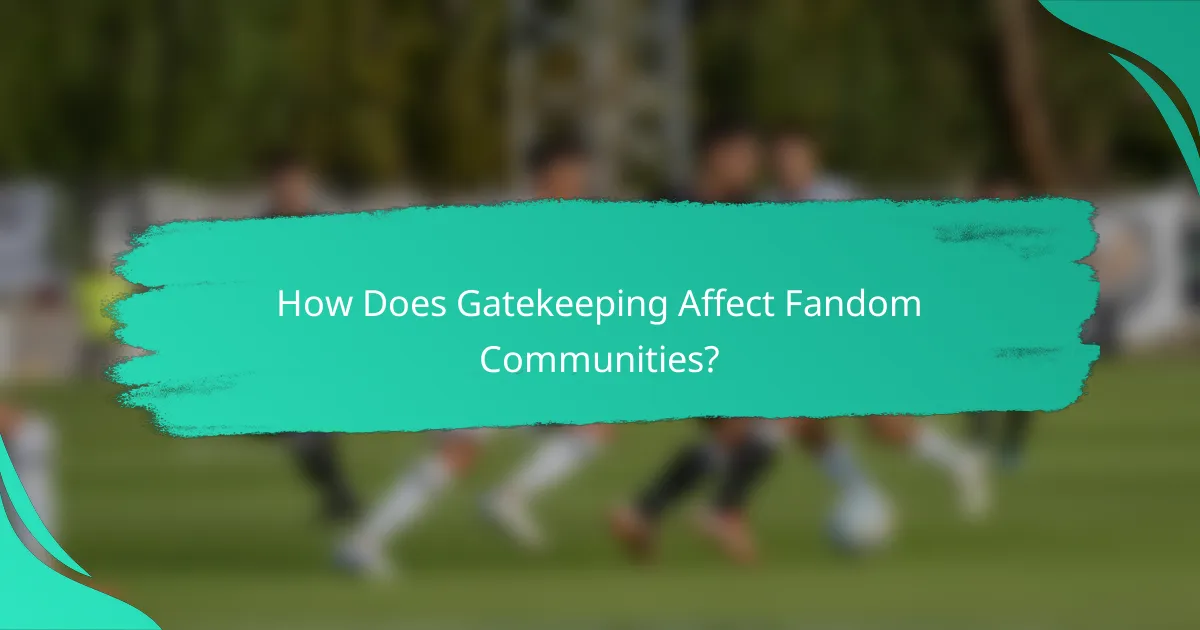
How Does Gatekeeping Affect Fandom Communities?
Gatekeeping in fandom communities can significantly hinder the inclusion of new members and stifle creativity. It often manifests as a barrier that prevents newcomers from fully engaging, leading to a less diverse and vibrant community.
Exclusion of new members
Gatekeeping practices often result in the exclusion of new fans who may not meet certain arbitrary criteria, such as knowledge of obscure lore or participation in specific events. This exclusion can create a sense of elitism, where only long-time fans feel welcome, discouraging fresh perspectives and ideas.
New members may feel intimidated by established fans who enforce these unwritten rules, leading to a cycle where only a select few dominate discussions. To foster inclusivity, existing members should actively welcome newcomers and encourage their participation.
Creation of toxic environments
When gatekeeping is prevalent, it can lead to toxic environments that discourage open dialogue and mutual respect. Fans may feel pressured to conform to specific norms or face backlash for expressing differing opinions, creating a hostile atmosphere.
This toxicity can manifest in various forms, including harassment or bullying, which can drive away both new and existing members. Communities should establish clear guidelines that promote respectful interactions and address negative behavior promptly to maintain a healthy space for all fans.
Impact on fan creativity
Gatekeeping can stifle fan creativity by limiting the types of contributions that are deemed acceptable within the community. When only certain interpretations or expressions of fandom are valued, it restricts the diversity of creative works, such as fan art or fan fiction.
Encouraging a broader range of creative expressions can enrich the community and inspire collaboration. Fandoms should celebrate unique contributions and provide platforms for all voices, ensuring that creativity thrives rather than being constrained by gatekeeping practices.
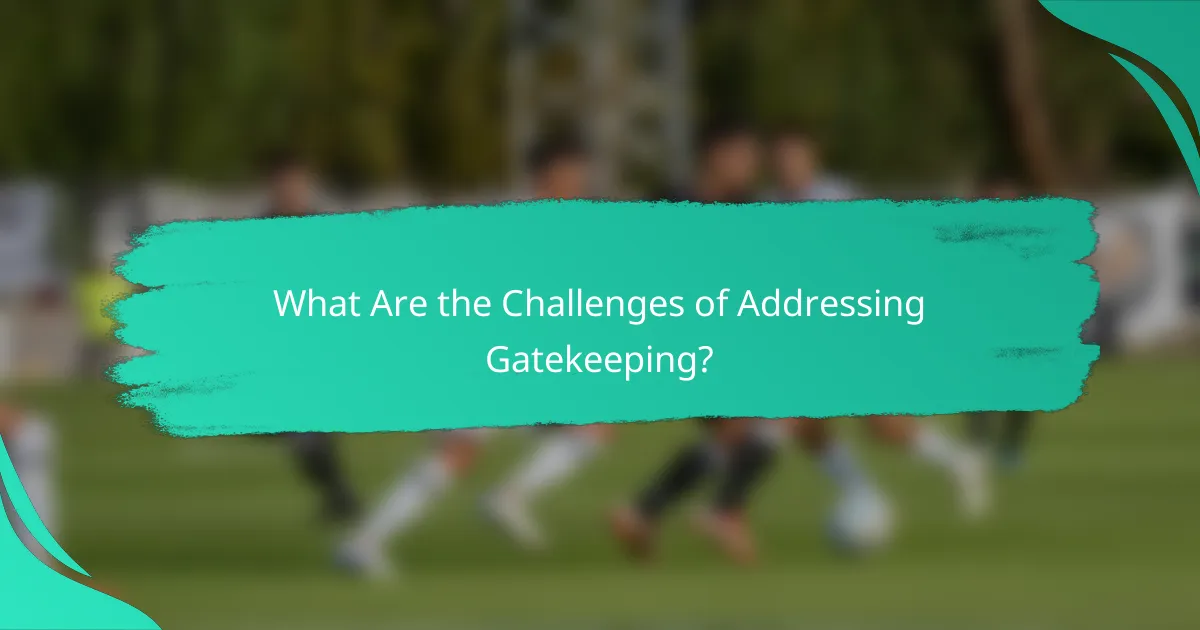
What Are the Challenges of Addressing Gatekeeping?
Addressing gatekeeping in fandoms involves overcoming several significant challenges that can hinder inclusivity. These challenges include resistance from established members, a lack of awareness about the issue, and the difficulty of balancing tradition with inclusivity.
Resistance from established members
Established members of fandoms often resist changes that promote inclusivity, fearing that their identity or the essence of the fandom may be diluted. This resistance can manifest in dismissive attitudes toward newcomers or those who do not conform to traditional norms.
To mitigate this resistance, it is essential to engage established members in discussions about the benefits of inclusivity. Highlighting how diversity can enrich the community and enhance shared experiences may help ease their concerns.
Lack of awareness about gatekeeping
Many fans may not recognize their own gatekeeping behaviors, which can perpetuate exclusion. This lack of awareness often stems from a misunderstanding of what gatekeeping entails and its negative impact on community dynamics.
Educational initiatives, such as workshops or discussions, can raise awareness about gatekeeping. Providing examples of inclusive practices and the positive outcomes they foster can encourage fans to reflect on their behaviors and adopt more welcoming attitudes.
Balancing tradition with inclusivity
Fandoms often have rich traditions that members cherish, making it challenging to introduce inclusive practices without alienating long-time fans. Striking a balance between honoring these traditions and welcoming new perspectives requires careful consideration.
One approach is to create spaces where both traditions and new ideas can coexist. For example, organizing events that celebrate the history of the fandom while also showcasing diverse voices can help bridge the gap and foster a more inclusive environment.
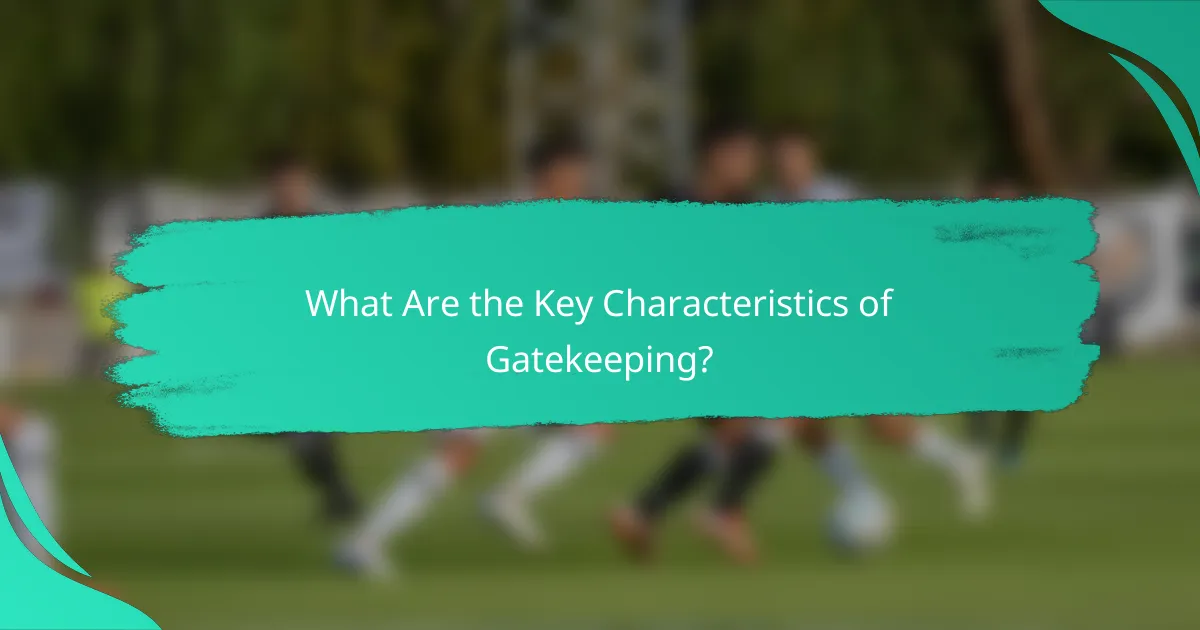
What Are the Key Characteristics of Gatekeeping?
Gatekeeping in fandoms involves establishing barriers that determine who is considered a true fan and who is not. This often manifests through specific criteria, control over resources, and assessments of knowledge about the fandom.
Defining membership criteria
Membership criteria in fandoms can include specific behaviors, knowledge, or even participation in certain activities. For example, some communities may require fans to have attended conventions or to own particular merchandise to be considered legitimate members.
These criteria can create an exclusive environment, making it difficult for newcomers to feel welcomed. It’s important for fandoms to balance the desire for authenticity with inclusivity to foster a supportive community.
Controlling access to resources
Gatekeeping often involves controlling access to resources such as fan fiction, artwork, or exclusive content. Some groups may restrict access to certain forums or social media groups based on perceived legitimacy, which can limit the sharing of creativity and ideas.
To mitigate this, fandoms can establish open platforms where all fans can contribute and share their work without stringent restrictions. This encourages a more diverse range of voices and creativity within the community.
Judgment of fan knowledge
Judgment of fan knowledge is a common form of gatekeeping, where established fans assess the knowledge of newcomers. This can manifest in quizzes or informal tests about the fandom’s lore, leading to feelings of inadequacy among those who are less familiar.
Fandoms should consider promoting a culture of learning and sharing rather than judgment. Encouraging mentorship or buddy systems can help new fans gain confidence and knowledge without feeling excluded.
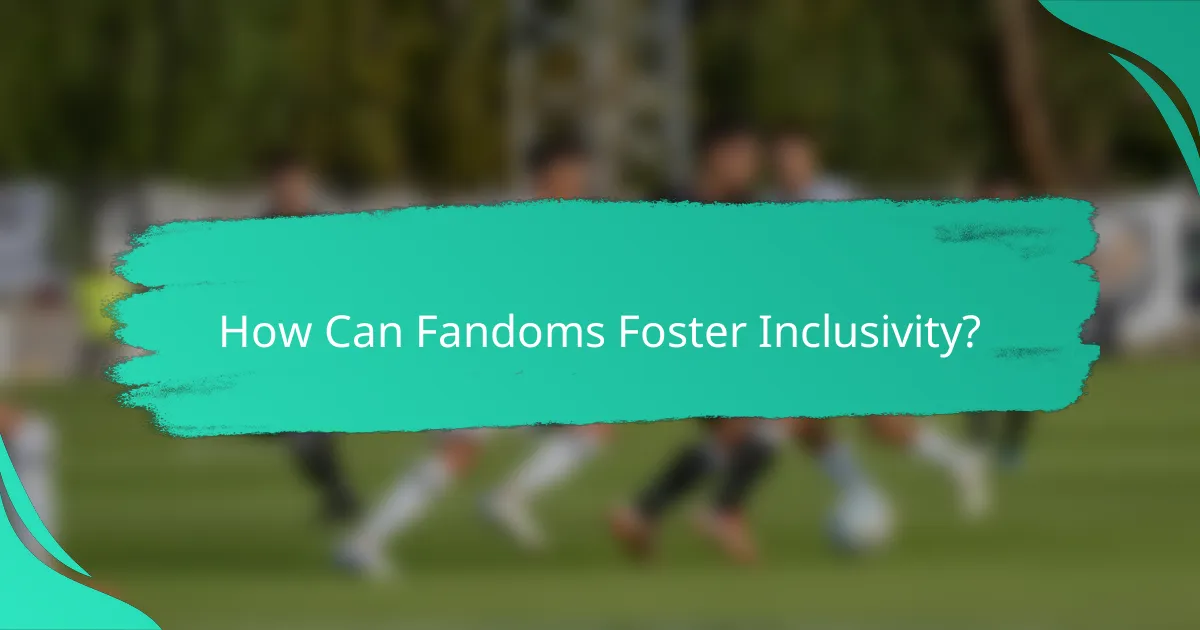
How Can Fandoms Foster Inclusivity?
Fandoms can foster inclusivity by actively welcoming diverse voices and perspectives, ensuring that all fans feel valued and represented. This involves creating environments where everyone can share their thoughts and experiences without fear of judgment or exclusion.
Encouraging diverse perspectives
Encouraging diverse perspectives means inviting fans from various backgrounds to share their unique insights and experiences. This can be achieved by featuring guest speakers from underrepresented communities at events or highlighting fan works that reflect different cultures and identities.
Fandoms can also create online platforms or forums where members can discuss their viewpoints freely. This not only enriches the community but also helps break down stereotypes and misconceptions.
Promoting fan-led initiatives
Promoting fan-led initiatives empowers community members to take charge of inclusivity efforts. This can include organizing events that focus on specific themes, such as cultural appreciation or mental health awareness, which resonate with a broader audience.
Additionally, fandoms can support crowdfunding campaigns for projects that highlight diverse stories or creators. This not only raises awareness but also provides financial backing for initiatives that might otherwise struggle for visibility.
Creating safe spaces for discussion
Creating safe spaces for discussion is essential for fostering an inclusive environment. These spaces should be free from harassment and discrimination, allowing fans to express their thoughts without fear of backlash. Establishing clear community guidelines can help maintain this safety.
Fandoms can also implement moderation practices to ensure that conversations remain respectful and constructive. Regularly scheduled discussions or workshops can further encourage open dialogue and understanding among members.
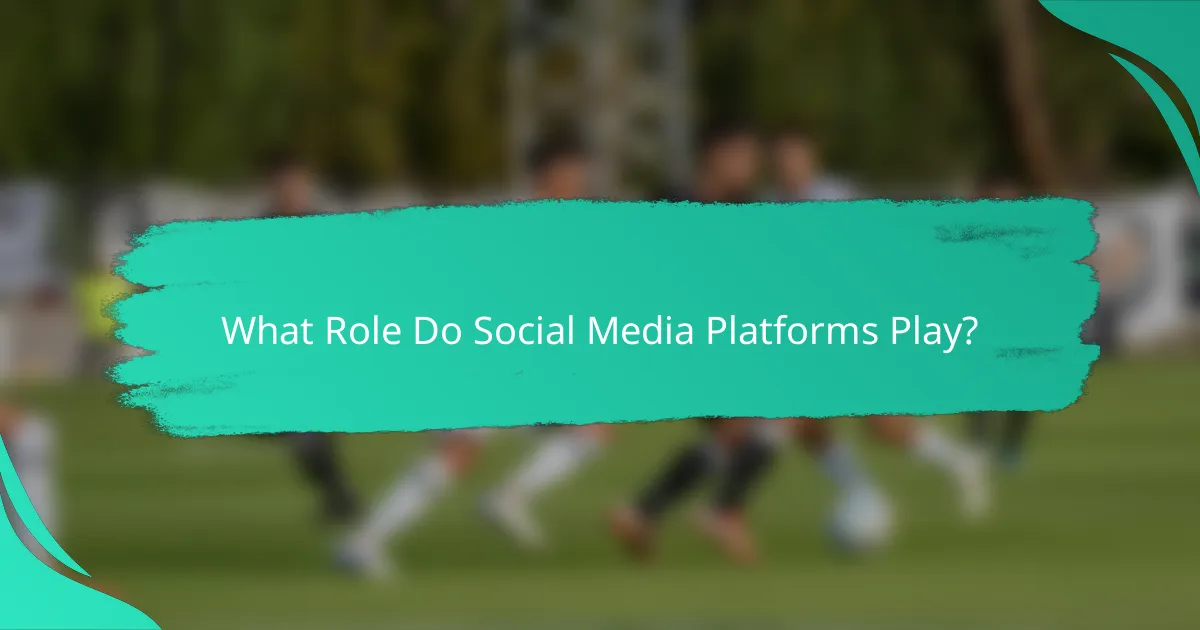
What Role Do Social Media Platforms Play?
Social media platforms significantly influence fandom dynamics by shaping interactions and community standards. They serve as spaces for fans to connect, share content, and express opinions, but they can also facilitate gatekeeping behaviors that exclude certain individuals or groups.
Facilitating Connections
Social media platforms allow fans to connect across vast distances, creating communities centered around shared interests. These platforms enable users to share fan art, theories, and discussions, fostering a sense of belonging. However, the ease of access can sometimes lead to conflicts over authenticity and authority within fandoms.
For example, platforms like Twitter and Instagram allow users to follow creators and engage directly, which can enhance community bonds. Yet, this accessibility can also result in some fans feeling marginalized if they are perceived as less knowledgeable or passionate.
Enforcing Norms
Social media often establishes unwritten rules that dictate acceptable behavior within fandoms. These norms can include how to engage with content, what constitutes “true” fandom, and acceptable ways to express enthusiasm. While these guidelines can help maintain community standards, they can also lead to exclusionary practices.
For instance, fans who do not adhere to specific jargon or who express differing opinions may face backlash. This can create an environment where only certain voices are amplified, leading to a narrow definition of what it means to be part of a fandom.
Amplifying Gatekeeping
Gatekeeping on social media manifests through various behaviors, such as dismissing newcomers or enforcing strict criteria for participation. This can discourage new fans from engaging and limit the diversity of perspectives within the community. The anonymity and reach of social media can exacerbate these behaviors, making it easier for gatekeepers to exert influence.
To combat gatekeeping, communities can promote inclusivity by celebrating diverse contributions and encouraging open dialogue. Initiatives like welcoming posts for new members or highlighting varied interpretations of content can help create a more inclusive atmosphere.
Creating Safe Spaces
Social media platforms can also serve as safe spaces for marginalized fans, allowing them to share their experiences without fear of judgment. These spaces can empower individuals who may feel alienated in traditional fandom settings. However, the challenge lies in balancing openness with the need to protect these spaces from toxic behaviors.
Encouraging respectful discourse and implementing clear community guidelines can help maintain these safe environments. Additionally, platforms can utilize moderation tools to filter harmful content and support positive interactions among fans.
